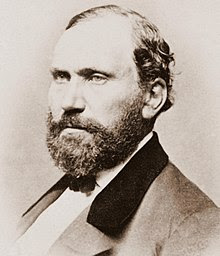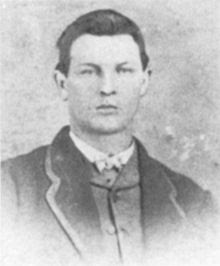Jackson by Tomas Sully - 1824
Taking time off from his many presidential duties, on a damp and misty Washington D.C. day, Jackson travels to the Capitol Building to attend the funeral of 41-year-old South Carolina congressman Warren R. Davis ... and almost becomes a corpse himself when he encounters a madman upon leaving the event.
Assassination Attempt
After stalking Jackson for days, waiting outside the East Portico for the president is a 35-year-old unemployed house painter from England named Richard Lawrence ... an armed maniac that believes all his problems will vanish if he kills Jackson. And he has lots of problems. Coming to America with his family at the age of 12, Lawrence seems normal until 1832, when he suddenly undergoes a change (some historians believe his unhinged mental state is a result of breathing in too much lead based paint fumes) ... vanishing from his family for months on end, claiming "unknown" individuals were out to "get" him, declaring himself to be King Richard III of England (the "My Kingdom for a horse!" royal that Shakespeare makes infamous in his play ... dead at the Battle of Bosworth Field in 1485!) and owed money by the United States government, threatening to kill a maid he believes has laughed at him, wearing flamboyant outfits that he changes three or four times a day, threatening to hit his sister over the head with a paperweight because he thinks she has been gossiping about him, standing in the doorway of his home looking out at the street for hours on end, having extended crying, laughing, and cursing fits, along with imaginary nonsensical conversations with himself, and sitting in his paint shop muttering to himself about the things he'd like to do to the president. Big time nuts, the day before his moment in history, the madness finally overcomes Lawrence ... decision made, assassination on, he smiles and states as he leaves his shop, "I'll be damned if I don't do it."
Jackson
And do it, he does!
Take That!
Not liking the shot he has as Jackson enters the Capitol, Lawrence positions himself near a large Greek pillar, in a spot he knows the president will pass on his exit from the funeral. And he is right ... after paying his respects and walking past the congressman's casket, Jackson walks right by Lawrence, giving the assassin an almost point-blank target. Seizing the opportunity he has been waiting for, Lawrence pulls a small percussion cap pistol from his pocket and fires at the president's back. BAM ... but no bullet comes out of the gun! Not fazed in the least as he has prepared for just such an event by bringing two guns to the offing, Lawrence draws and fires his back-up weapon with the same result ... POP ... but no bullet (after, the guns and powder are checked and work perfectly fine and it is believed the dampness of the day might have caused the guns to fail to fire ... others believe it is an act of Providence ... whatever the cause, the Smithsonian will one day give odds of 1 in 125,000 of both pistols failing to shoot).
Scene at the Capitol
Two chances is all he gets though because his intended victim is a man very well acquainted with violence and its many applications. Jackson, 67-years-young, bearing scars on his left hand and head from where a British officer slashed him with a saber for refusing to shine the soldier's boots, carrying a duelist's bullet in his chest since 1806 (at odds over a horse race bet and insults to his wife, Jackson lets plantation owner and rival horse breeder Charles Dickinson fire first ... hit, the future president puts his hand over the wound to staunch the blood, fights through the pain of a hole and two broken ribs only two inches away from his heart, takes careful aim, and from 24 feet away, puts a round in Dickinson's chest that proves fatal), the victor over the British at the Battle of New Orleans, the victor over the "Red Stick" Creek Indians of Alabama and Georgia at the Battle of Horseshoe Bend, the man who whose attacks against the Seminoles in Florida forces Spain to cede the territory to the United States, reacts instantly to the attempt on his life.
Jackson
Pivoting, Jackson races at Lawrence, and when the second shot of the assassin fails, gives an up-close-and personal display of how he earned the nickname, Old Hickory ... beating his would-be killer about the head and shoulder with the hickory cane he always carries. It is a demonstration of Jackson's violent temper that might have proved fatal had not another mourner at the funeral intervened to pull the president off Lawrence ... a bear of a man himself, the 12th District of Tennessee's representative in the U.S. House, Mr. David "Davey" Stern Crockett! The attempt on Jackson's life is the first against a sitting United States president ... sadly, it will not be the last.
Crockett
Saved to stand trial, Lawrence goes before a judge and jury at the District of Columbia City Hall on 4/11/1835, and quickly becomes evident he is not playing with a full deck. Only a day in the dock, Lawrence, dressed in a shooting jacket and posh cravat, refuses to acknowledge the court's authority, makes wild rants, calls himself Richard III, declares Jackson killed his father, and insults the jury. NUTS ... the jury takes only five minutes to render a verdict of "not guilty by the reason of insanity." Oh, and the prosecutor who goes after Lawrence is yet another famous someone ... attorney Francis Scott Key, the part-time poet that in 1814 wrote the Star Spangled Banner while watching as the British attacked Baltimore's Fort McHenry during the War of 1812.
Francis Scott Key
Confined for the rest of his life in a number of institutions, Lawrence is finally sent to the newly opened Government House for the Insane in 1855, perishing there in 1861 at the age of 61.
And Jackson? He goes on making more history ... so much so that he becomes the face that now graces the $20 bill, dying at the age of 78 in Nashville, Tennessee, in 1845 as a result of tuberculosis, dropsy (an abnormal accumulation of fluids beneath the skin and in the cavities of the body), and heart failure.
At the End - 1845






